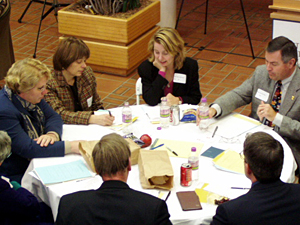Photos
Respond to this story
| |||||||||||||||||||||||||||||||||||||||||||
Legislators work to get past bickering
January 6, 2005
With the new year and the new legislative session, there've been an awful lot of resolutions among lawmakers to find common ground and cross-party compromise. But what does it take to build that sort of consensus? A group of legislators is seeking that answer as part of a two-day workshop they're calling "Beyond Bickering."
St. Paul, Minn. — Three years ago Sen. Sheila Kiscaden, IP-Rochester, was a Republican. Then, after losing the GOP endorsement for re-election in 2002, she joined the Independence Party. At first, she continued to ally herself with her Republican colleagues but has since migrated to the DFL side. She says her odyssey and her search for a political home led her to appreciate the value of cooperation and legislative civility.
"Compromise is not a four-letter word," she said Thursday. "Compromise is what resolving public disputes is about; finding solutions, finding things that work for the good of the whole, having a vision for the future. All of those things are what people really expect us to do."
Kiscaden helped organize the "Beyond Bickering" workshop at the University of Minnesota's Humphrey Institute. Much of the problem, she says, stems from an increasingly partisan tone among the political activists who control the endorsement and nominating process for elected officials. She says that's alienated lawmakers from the bulk of Minnesotans who, she says, are moderates.
Sen. Claire Robling, R-Jordan, says there's some truth to that. Robling says candidates are often forced to make promises that ultimately prevent them from reaching compromise with other lawmakers.
"We do walk a very fine line. You have to hang on to what you say you're going to do as long as you possibly can. And then you have to be able to explain to your constituents when you deviate from that," she said.
Robling says she originally signed the no-new-taxes pledge that has been one of Gov. Tim Pawlenty's guiding principals. But Robling says she felt compelled to rescind it when she considered the state's transportation needs and the revenue a gas tax increase could produce.
Other participants bemoaned everything from the physical distances between lawmakers' Capitol offices to media reports that heighten a sense of conflict for dramatic purposes. A recurring theme, however, was that elected officials simply didn't know enough about each other as individuals.
House Majority Leader Erik Paulsen, R-Eden Prairie, says, if nothing else, the seminar has given 60 or so colleagues a chance to mingle and speak freely.
"I honestly believe there's always value from having legislators from various parties and the House and the Senate get together on a more social basis, talk about why they feel the way they do on certain issues, why, maybe, the processes institutionally occur the way they do. And, you know, we miss some of those conversations," he said.
More than one participant blamed a decline in congeniality on a lobbyist gift ban enacted in 1994. Among other things, the ban prevents lobbyists from paying for the receptions and parties where lawmakers once-upon-a-time mingled.
Sen. John Marty, DFL-Roseville, was the principal architect of that reform, and he dismissed criticisms that the gift ban created an impersonal Legislature.
"We ought to talk to each other outside of floor session, outside of committee on an informal basis. But you don't have to have lobbyists foot the bill for everything in order to talk with each other. We can take each other out to dinner without having lobbyists pay our way," according to Marty.
Despite lawmakers' best intentions, it's a good bet that, as this legislative session unfolds, it will contain its share of bruising battles. But that isn't necessarily a bad thing.
Rep. Phyllis Kahn, DFL-Minneapolis, says disagreement is natural and essential to sharpening debate and clarifying legislation. She says the last thing lawmakers should do is drain the Capitol of principled conflict.
"Nothing would make this place more boring than doing that. And the point is -- but you have to recognize conflict and you have to recognize the value of conflict and appreciate the value of conflict, you know, without having conflict for its own sake," Kahn said.
That's the first trick. The second is remembering it five months from now.
|
News Headlines
|
Related Subjects
|


